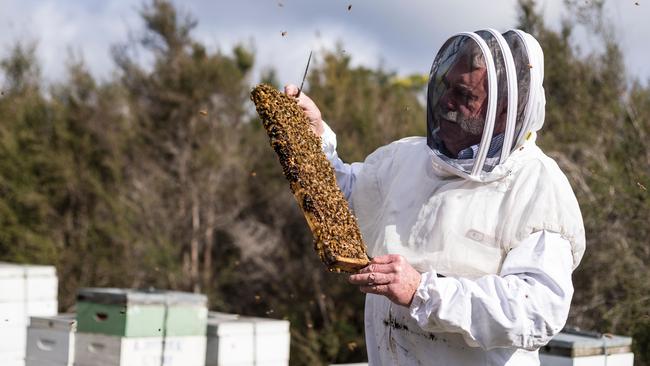Tassie’s bees are starving as honey crisis hits hard
UPDATED: Tasmania’s beekeepers are frantically moving their hives from the West Coast rainforests to prevent their bees from starving.
Tasmania
Don't miss out on the headlines from Tasmania. Followed categories will be added to My News.
TASMANIAN beekeepers are facing huge financial losses after one of the worst season’s the industry has seen.
Hot and dry conditions combined with bushfires in southern wilderness regions has seen this year’s leatherwood honey yields plummet by 90 per cent.
Many are now frantically moving their hives out of the West Coast rainforests to prevent the bees from starving.
Some of the state’s larger beekeeping businesses are facing losses in the millions and have already been forced to cut their workforces.
Tasmanian Beekeepers Association president Lindsay Bourke said it is the worst season he has ever seen.
“It’s the worst by miles,” he said.
“Everyone is extremely worried and we’re just doing everything we can to get them out and try to keep them alive at the moment. Some of the business that haven’t diversified into other things have been hit particularly hard.”
MORE
BUSHFIRES A ‘TOTAL DISASTER’ FOR HONEY INDUSTRY
THE STARK REALITY FACING BEEKEEPERS
Leatherwood honey makes up about 70 per cent of the state’s honey crop and is exported to markets all over the world.
Each year Tasmania produces around 700 tonnes of leatherwood but Mr Bourke said this year there has only been a fraction of that.
“The rainforests were unnaturally dry, so the leatherwood trees just either didn’t flower at all, or if they did the flowers just wilted and didn't have any pollen in them,” he said.
“The small amount of honey we did get isn’t what I’d call good quality leatherwood either, because the bees were so desperate they were just working any flowers they could so there’s a bit of everything in there.”

Beekeepers are now moving hives to areas they hope the bees will be able to find some flowers to make honey to help keep them alive through the winter.
However Mr Bourke said most operators would have to buy in large amounts of sugar to feed the bees over the colder months to prevent them from starving.
“We’ll have to buy in many containers of it,” he said.
“It will keep them alive, but it’s very expensive and costs about $20,000 a container so it will be a huge cost.”
Mr Bourke said the situation was even more dire for beekeepers in the bushfire affected regions.
“Some of the southern beekeepers haven’t even been able to get in to check their hives yet because of the bushfires,” he said.
“They don’t know if some of their hives have been burnt or if they’re just sitting there starving. We’ve approached two Government ministers to see if we can get them access, but they can’t go against the advice of the Fire Service when there are dangerous trees and things like that, but it's a terrible situation.”
As well as honey production, beekeepers are also a vital part of the state’s fruit and vegetable seed industries providing critical pollination services.
Mr Bourke said the full impact of the current crisis will be widespread.
“This will definitely have an impact on pollination because we struggle to have enough hives to pollinate all the crops now, he said.
“We won’t have the numbers this season and the other thing is without the income from honey, beekeepers won’t have enough money to build back up again.”
An industry wide crisis meeting will be held on March 29.
MORE NEWS:
HISTORIC BUILDING COMPLEX TO HIT MARKET
HICKEY CHASES EXTRA CASH FOR TASTE
WILD WEATHER STRIKES TASSIE IN YEAR OF EXTREMES
Primary Industries and Water Minister Guy Barnett said the Government was working with the bee industry to address both strategic needs and immediate issues resulting from the historically difficult season.
This includes both the direct impact of the recent bushfires and wider seasonal impacts on production.
Producers directly affected by the bushfires have access to a range of assistance.
This includes Bushfire Small Business Disruption grants of up to $2000, longer-term Bushfire Business Recovery Grants of up to $25,000 and the soon to be introduced Concessional Business Recovery Loan Scheme for loans of up to $100,000 to help businesses re-establish after the fires.
Mr Barnett said the Government continued to work with the industry to assess the wider seasonal issues affecting production and the Department of State Growth is working with affected producers to determine the need for further assistance on an individual basis.
An industry wide crisis meeting will be held on March 29.
Originally published as Tassie’s bees are starving as honey crisis hits hard


